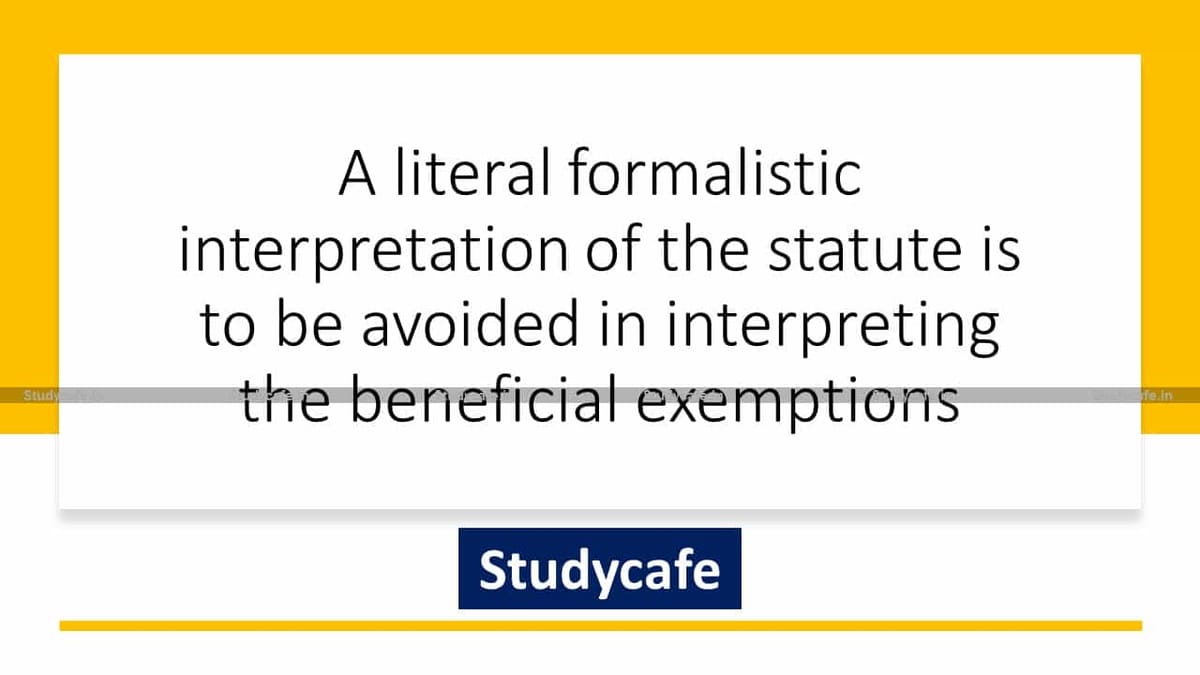A literal formalistic interpretation of the statute is to be avoided in interpreting the beneficial exemptions
CA Bimal Jain | Apr 12, 2021 |

A literal formalistic interpretation of the statute is to be avoided in interpreting the beneficial exemptions
The Hon’ble Supreme Court of India in Government of Kerala & Anr. v. Mother Superior Adoration Convent [Civil Appeal No. 202 of 2012 and others, decided on March 1, 2021] upheld the judgments passed by the Hon’ble Kerala High Court allowing the exemption of tax on buildings used as residential quarters for nuns, priests or hostel accommodation for students. Held that, a literal formalistic interpretation of the statute is to be avoided in interpreting the beneficial exemptions.
Various appeals were filed by the State of Kerala (“the Appellant No. 1”) pertaining to an exemption provision contained under Section 3(1)(b) of the Kerala Building Tax Act, 1975 (“Kerala Building Tax Act”) with regard to building tax on buildings that are used principally for religious, charitable or educational purposes/activities or as factories or workshops and against the judgments of the Hon’ble Kerala High Court in Government of Kerala & Anr v. Mother Superior Adoration Convent (Civil Appeal No.202 of 2012, dated November 22, 2007) and State of Kerala & Ors v. Unity Hospital (P) Ltd. (Civil Appeal No. 207 of 2012 dated December 21, 2010) wherein it was decided to exempt such buildings from the tax that are used as residential quarters for nuns, priests or hostel accommodation for students.
Further, an appeal was filed by Jos Giri Hospital (“the Appellant No. 2”) against the judgment of the Hon’ble Kerala High Court in Administrator, Jos Giri Hospital v. Government of Kerala (WP(C). No. 25912 of 2006(I), dated July 23, 2008) which was decided in favour of the State of Kerala and disallowed the exemption of building tax.
The Appellant No. 1 has contended that an exemption provision contained in a fiscal statute must be construed strictly and in the case of doubt or ambiguity must be construed in favour of the State. Further, contented that the building being used principally for religious or educational purposes can only be a building that is used for religious/educational activity and not for activity which has no direct connection with religious/educational activity, such as residential quarters for nuns, priests or hostel accommodation for students.
Whether hostel building and residential accommodation for nuns is entitled for exemption from building tax under Section 3(1)(b) of the Kerala Building Tax Act and can be treated as a building used for charitable purposes or religious activities?
The Hon’ble Supreme Court of India in Civil Appeal No. 202 of 2012, decided on March 1, 2021, held as under
Section 3(1) of the Kerala Building Tax Act:
“3. Exemptions. – (1) Nothing in this Act shall apply to –
(a) buildings owned by the Government of Kerala or the Government of India or any local authority; and
(b) buildings used principally for religious, charitable or educational purposes or as factories or workshops.
Explanation. – For the purposes of this sub-section, “charitable purpose” includes relief of the poor and free medical relief.”
DISCLAIMER: The views expressed are strictly of the author and A2Z Taxcorp LLP. The contents of this article are solely for informational purpose. It does not constitute professional advice or recommendation of firm. Neither the author nor firm and its affiliates accepts any liabilities for any loss or damage of any kind arising out of any information in this article nor for any actions taken in reliance thereon.
In case of any Doubt regarding Membership you can mail us at contact@studycafe.in
Join Studycafe's WhatsApp Group or Telegram Channel for Latest Updates on Government Job, Sarkari Naukri, Private Jobs, Income Tax, GST, Companies Act, Judgements and CA, CS, ICWA, and MUCH MORE!"